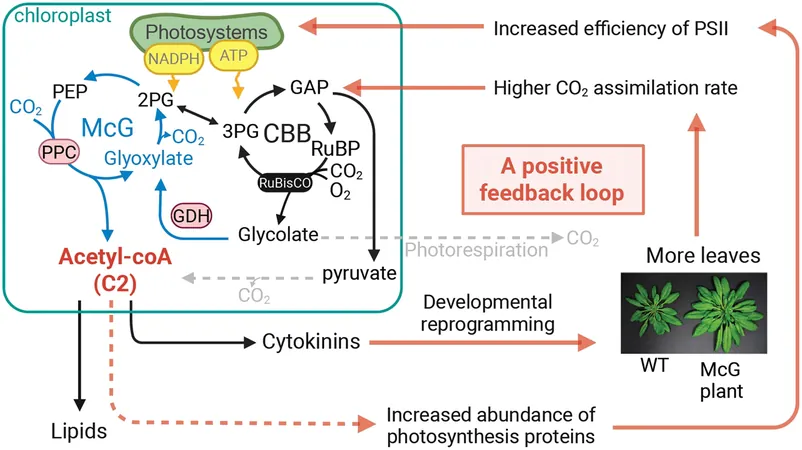
Revolutionary Plant Engineering: Doubling Carbon Uptake for a Greener Future!
2025-09-15
Author: Arjun
An Innovative Solution to Plant Efficiency Challenges
Plants have always had a heavy responsibility on their green shoulders: transforming carbon dioxide from the atmosphere into the organic matter necessary for their growth. However, the cornerstone cycle for this process, known as the Calvin-Benson-Bassham (CBB) cycle, suffers from significant inefficiencies—losing a staggering one-third of carbon during lipid production and further losses due to photorespiration.
A Game-Changer: Introducing the McG Cycle!
In a groundbreaking study recently published in *Science*, researchers are rewriting the rules of carbon uptake by introducing a completely new metabolic pathway: the malyl-CoA-glycerate (McG) cycle. This synthetic pathway, incorporated into the model plant **Arabidopsis thaliana**, complements the existing CBB cycle to create a dual system designed to reclaim wasted carbon and ramp up overall efficiency.
Impressive Results from the Lab!
When the McG cycle was put to the test, the results were astonishing! Plants engineered with this new cycle exhibited growth up to three times greater than their wild counterparts, boasting increased leaf and seed production and an extraordinary lipid content—up to 100 times higher in triglycerides! Such a significant increase caused the plants to develop specialized pockets within their cells to store the excess fats.
Potential Benefits: A Greener Future?
The introduction of the McG cycle not only slashed photorespiratory CO2 losses but also significantly boosted acetyl-CoA production. Overall, the carbon dioxide assimilation rates were approximately doubled, positioning these plants as potential powerhouses in the fight against climate change.
Caution Ahead: What Does This Mean for the Future?
Despite these promising results, the researchers caution that these benefits may not be easily transferable to crop species. Factors like gene expression stability over generations and potential short-term carbon sequestration raise questions about the practicality of widespread implementation. Furthermore, the ecological implications of such modifications remain largely unexplored.
A Step Towards Sustainable Agriculture and Biofuels!
With further research and exploration, the developments from this study could usher in a new era of agricultural productivity, enhancing crop yields, oil production for biofuels, and improving carbon capture—a trio of benefits that could play a vital role in combating climate woes!



 Brasil (PT)
Brasil (PT)
 Canada (EN)
Canada (EN)
 Chile (ES)
Chile (ES)
 Česko (CS)
Česko (CS)
 대한민국 (KO)
대한민국 (KO)
 España (ES)
España (ES)
 France (FR)
France (FR)
 Hong Kong (EN)
Hong Kong (EN)
 Italia (IT)
Italia (IT)
 日本 (JA)
日本 (JA)
 Magyarország (HU)
Magyarország (HU)
 Norge (NO)
Norge (NO)
 Polska (PL)
Polska (PL)
 Schweiz (DE)
Schweiz (DE)
 Singapore (EN)
Singapore (EN)
 Sverige (SV)
Sverige (SV)
 Suomi (FI)
Suomi (FI)
 Türkiye (TR)
Türkiye (TR)
 الإمارات العربية المتحدة (AR)
الإمارات العربية المتحدة (AR)